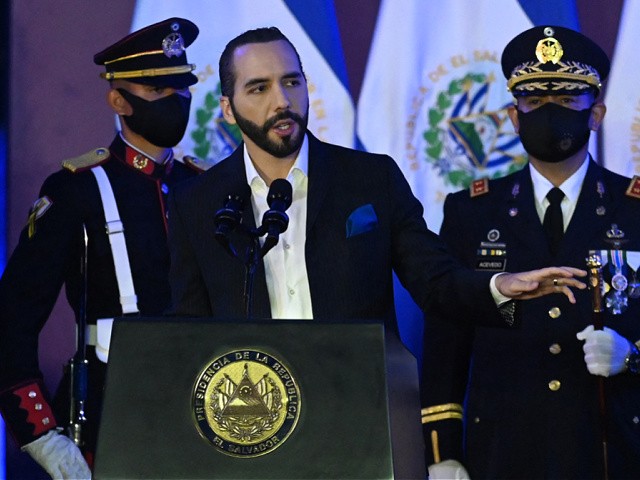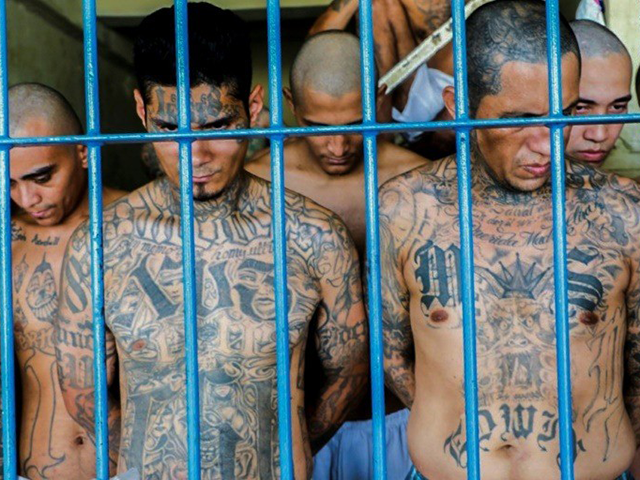El Salvador on Tuesday formally opened an immense prison called the Terrorism Confinement Center. The prison has 40,000 beds, making it one of the largest in Latin America, with more capacity than all of El Salvador’s 20 existing penal facilities combined.
Most of those existing prisons are filled far beyond their nominal capacity, as President Nayib Bukele’s war on organized crime has put almost two percent of the population behind bars while cutting the homicide rate by over 50 percent. The largest prison in El Salvador until now, La Esperanza, is rated for 10,000 inmates but currently holds more than triple that number.

Salvadoran President Nayib Bukele delivers a speech during the commemoration of the Day of the Salvadoran Soldier and the 197th anniversary of the Salvadoran Armed Forces, at the Captain General Gerardo Barrios Military School, in Antiguo Cuscatlan, El Salvador, on May 7, 2021. (MARVIN RECINOS/AFP via Getty Images)
The police have arrested over 62,000 gang suspects since last March, when Bukele requested congressional approval for a “state of exception,” a cross between a state of emergency and martial law which, to put it bluntly, makes it much easier to imprison suspected gangsters.
Bukele made the request after a horrifying weekend of gang violence killed over 80 people. The state of exception has been extended ten times, most recently on January 12 of this year, when the legislature granted a 30-day extension with 67 out of 84 votes.
El Salvador's recent spike in violence exposed the country's inequality and contradictions. Some "need to work to survive, exposed to arbitrary and random violence." Others — including foreigners in tourists hotspots — are shielded from this reality. https://t.co/jV1tu6wcbY
— Anna-Cat Brigida (@AnnaCat_Brigida) March 28, 2022
Bukele argues the state of exception is necessary to crack down on gangs, which control much of El Salvador’s territory and boast an army of some 70,000 enforcers between the two most notorious criminal organizations, Barrio 18 and Mara Salvatrucha, better known in the United States as MS-13. A teenage MS-13 member from El Salvador easily slipped through President Joe Biden’s open border around the same time Bukele requested his state of exception and is now in U.S. custody for allegedly strangling a 20-year-old autistic woman named Kayla Hamilton in Maryland in July.
'He should have never been allowed in': Mother demands border fix after daughter's murder by suspected MS-13 immigranthttps://t.co/H8r1naVbKe
— RNC Research (@RNCResearch) February 1, 2023
Critics such as Human Rights Watch (HRW) agree the gang problem in El Salvador is a massive crisis but argue the state of exception is damaging to the country’s democratic institutions and is too often abused to put innocent people in jail.
“Many arrests appear to have been based on the appearance or social background of the detainees, and local human rights groups have documented that hundreds of people with no connection to gangs have been detained,” HRW asserted, charging national security forces with abuses such as “arbitrary arrests, enforced disappearances, torture and other forms of ill-treatment, and due process violations.”
Bukele announced the construction of the Terrorism Confinement Center near San Vicente in June, comparing it to the speedy construction of emergency medical facilities during the Wuhan coronavirus pandemic.
“Just as at the beginning of the pandemic, we built the largest hospital in Latin America to care for Covid-19 patients in record time, now we must build a prison to intern the tens of thousands of terrorists who stalked our country,” he said.
Les presento la construcción del:
CENTRO DE CONFINAMIENTO DEL TERRORISMO
En esta #GuerraContraPandillas y gracias al Régimen de Excepción, hemos arrestado a más de 40,000 terroristas.
Pero aún falta camino por recorrer… pic.twitter.com/4TUI7LK2CQ
— Nayib Bukele (@nayibbukele) June 22, 2022
Bukele said the prison would be built “away from the cities, surrounded by hundreds of blocks of land owned by the State, with hundreds of thousands of meters of construction, several levels of walls, and 37 watchtowers, which will make escape impossible.”
El Salvador’s war on gangs troubles some human rights advocates, but it is very popular with the Salvadoran people, and Bukele himself enjoys an 86% approval rating. Among the reactions to his announcement of the Terrorism Confinement Center in June were suggestions that he fill the surrounding woodlands with booby traps, crocodile pits, and man-eating tigers to ensure none of the imprisoned gang members can escape.
El Salvador’s director of prisons, Osiris Luna, said the prison will have to make do with 600 troops and 250 police officers for security in lieu of crocodiles and tigers.
“All those home boys, those terrorists in the organization that made our beloved Salvadoran people suffer, will be housed and subjected to a severe regimen,” Luna said in a state television interview.
On Wednesday, Bukele posted video of his tour of the new prison, touting its seven concentric “rings” of security that range from steel-reinforced cells to electrified fences. He mocked prisons that give inmates access to “prostitutes, computers, TVs, PlayStations, and mobile phones,” and promised gangsters would face a more austere existence at the gigantic Terrorism Confinement Center.
El Salvador ha logrado pasar de ser el país más inseguro del mundo, al país más seguro de América.
¿Cómo lo logramos?
Metiendo a los criminales en la cárcel.
¿Hay espacio?
Ahora sí.
¿Podrán dar órdenes desde adentro?
No.
¿Podrán escapar?
No.
Una obra de sentido común. pic.twitter.com/WXiYohGkd4
— Nayib Bukele (@nayibbukele) February 2, 2023
“El Salvador has gone from being the most insecure country in the world to the safest country in the Americas,” Bukele said. “How did we do it? Putting criminals in jail. Is there space? Now there is, yes. Will they be able to give orders from inside? No. Can they escape? No.”

COMMENTS
Please let us know if you're having issues with commenting.